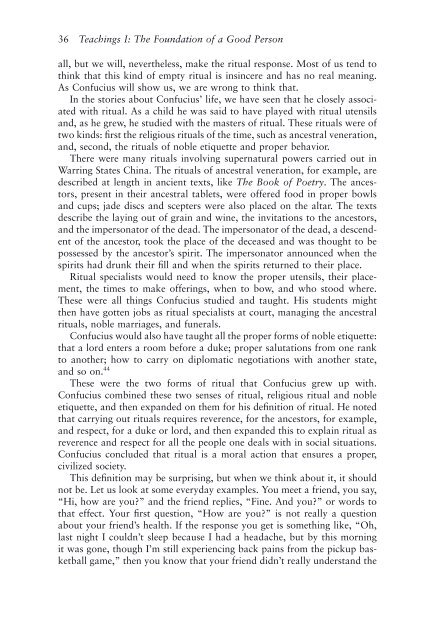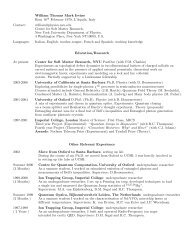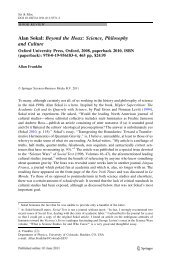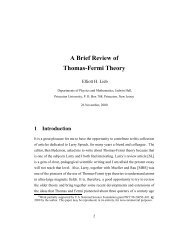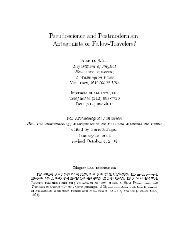Good Confucianism book (pdf) - Department of Physics
Good Confucianism book (pdf) - Department of Physics
Good Confucianism book (pdf) - Department of Physics
Create successful ePaper yourself
Turn your PDF publications into a flip-book with our unique Google optimized e-Paper software.
36 Teachings I: The Foundation <strong>of</strong> a <strong>Good</strong> Personall, but we will, nevertheless, make the ritual response. Most <strong>of</strong> us tend tothink that this kind <strong>of</strong> empty ritual is insincere and has no real meaning.As Confucius will show us, we are wrong to think that.In the stories about Confucius ’ life, we have seen that he closely associatedwith ritual. As a child he was said to have played with ritual utensilsand, as he grew, he studied with the masters <strong>of</strong> ritual. These rituals were <strong>of</strong>two kinds: first the religious rituals <strong>of</strong> the time, such as ancestral veneration,and, second, the rituals <strong>of</strong> noble etiquette and proper behavior.There were many rituals involving supernatural powers carried out inWarring States China. The rituals <strong>of</strong> ancestral veneration, for example, aredescribed at length in ancient texts, like The Book <strong>of</strong> Poetry . The ancestors,present in their ancestral tablets, were <strong>of</strong>fered food in proper bowlsand cups; jade discs and scepters were also placed on the altar. The textsdescribe the laying out <strong>of</strong> grain and wine, the invitations to the ancestors,and the impersonator <strong>of</strong> the dead. The impersonator <strong>of</strong> the dead, a descendent<strong>of</strong> the ancestor, took the place <strong>of</strong> the deceased and was thought to bepossessed by the ancestor ’ s spirit. The impersonator announced when thespirits had drunk their fill and when the spirits returned to their place.Ritual specialists would need to know the proper utensils, their placement,the times to make <strong>of</strong>ferings, when to bow, and who stood where.These were all things Confucius studied and taught. His students mightthen have gotten jobs as ritual specialists at court, managing the ancestralrituals, noble marriages, and funerals.Confucius would also have taught all the proper forms <strong>of</strong> noble etiquette:that a lord enters a room before a duke; proper salutations from one rankto another; how to carry on diplomatic negotiations with another state,and so on. 44These were the two forms <strong>of</strong> ritual that Confucius grew up with.Confucius combined these two senses <strong>of</strong> ritual, religious ritual and nobleetiquette, and then expanded on them for his definition <strong>of</strong> ritual. He notedthat carrying out rituals requires reverence, for the ancestors, for example,and respect, for a duke or lord, and then expanded this to explain ritual asreverence and respect for all the people one deals with in social situations.Confucius concluded that ritual is a moral action that ensures a proper,civilized society.This definition may be surprising, but when we think about it, it shouldnot be. Let us look at some everyday examples. You meet a friend, you say,“ Hi, how are you? ” and the friend replies, “ Fine. And you? ” or words tothat effect. Your first question, “ How are you? ” is not really a questionabout your friend ’ s health. If the response you get is something like, “ Oh,last night I couldn ’ t sleep because I had a headache, but by this morningit was gone, though I ’ m still experiencing back pains from the pickup basketballgame, ” then you know that your friend didn ’ t really understand the


